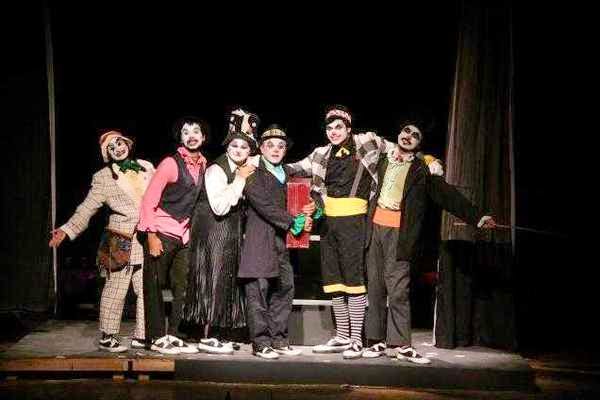By Naman Govil
Shakespeare, perhaps, would never have imagined a bunch of clowns interpreting and enacting his plays. For that matter, how many of us picture clowns on stage while reading Hamlet or King Lear? Unless of course, you are Rajat Kapoor and are fascinated by clowns and Shakespeare in equal measure.
Five years ago, Rajat Kapoor decided to adapt Hamlet. However, he decided to have clowns interpret The Great Bard’s words. What emerged is definitely one of the most enthralling theatrical experiences of my life! Recently, him and his bandwagon of clowns visited Delhi to stage his two adaptations of Shakespeare’s plays – Hamlet The Clown Prince and Nothing Like Lear. The plays left us awestruck – and we just had to speak with him about this idea, the process, the actors, and much more.
In conversation with director and writer extraordinaire… Rajat Kapoor.
 {L to R | Atul Kumar, Rajat Kapoor & Vinay Pathak}
{L to R | Atul Kumar, Rajat Kapoor & Vinay Pathak}
Naman | Shakespeare and gibberish-speaking-clowns - that's an extremely volatile and interesting idea! How did the idea of adapting Shakespeare in the form of clown theatre come about? What was the inspiration?
R | You know, we had done a play called ‘C for Clowns’ in 1999. That was the first time I had done a play with clowns. Clowns also appeared in a short film I made before that, called Hypnothesis, and there was a whole clown sequence in that – so the fascination with clowns is quite old actually. I think even in my films, in some way or the other, clowns make an appearance - not necessarily in clown make-up though. I always wanted to do Hamlet as well, and when we started working on it 5 years ago, the idea was just to do Hamlet, but with clowns. And we didn’t know anything more than that – what the play will be like, what shape it will take. Nothing. We didn’t even have a script. Everyday, we would improvise, but the idea was very clear – we wanted to tell the story of Hamlet through clowns.
N | So the entire script came about through improvisation?
R | Absolutely. When we started, we had nothing. No idea at all. The first day of rehearsal, we started with the first scene, and we tried to crack it, to figure out how we would play it, how clowns would play it. Everyday, we tried something new and slowly, we started re-writing scenes; we started changing the edit of the play. And that’s how the play emerged over a period of 3 months.
N | During the play also it felt like it felt like huge portions were improvised - and that worked really well.
R | To be honest, there is not so much improvisation by the actors in the actual play. There are only a few scenes in the play that are left open to improvisation. But otherwise, the play is very tight. The words are very very tight. I would say that 98% of the play is fixed, it’s only in that remaining 2% that there’s any room for improvisation. However, the actors make it look like it’s improvised – and that is where their talent comes into play.
N | You first performed this play five years ago. Since then has the script gone through any changes?
R | Yes, absolutely. We keep trying new things and if they work we keep them in the play. Also we keep rehearsing. Everytime we have new shows coming, we rehearse a lot. And in the rehearsals things keep coming up, we keep on adding or chopping things.
 {Still from Hamlet- The Clown Prince}
{Still from Hamlet- The Clown Prince}
N | These plays have been staged all over the world in front of all sorts of audiences. Do you mould the pop culture references in the plays depending on where you are performing?
R | Not really. Most of the pop culture references in the play are fairly universal. So if a character is referencing a Batman film, then I don’t need to change that, because the whole world knows about Batman.
N | I want to talk about the actors and the sort of preparation they have to go through for characters like these. Theatre is a medium that relies heavily on energy and intensity. Clown theatre takes this one notch above. How do actors typically prepare for this?
R | They are all very good actors. All the 6 actors in Hamlet are extremely skilled and experienced. So I just tried to use the best in them. In the sense – each actor came up with his or her own clown character, using his or her own personality. For example, the actor who plays the clown Fido in the play is forgetful and had a problem remembering his lines, so we modeled a clown on him - someone who replaced Shakespeare’s lines with pop culture references. And all of this came out of who he is as a person and an actor. I think it’s always good to use the actor’s strengths and work with those; to try and extract who they are and what they want, and then work with that.
N | You often work with the same set of actors. They are all undoubtedly great actors, so it makes sense, but are there any other reasons for that?
R | Well, we understand each other’s creative process really well. But also, most people I work with are my friends. And when you are working with friends you are not afraid of exploring, you are not afraid of letting your pants fall down. You are not scared of making a fool out of yourself. There is a huge amount of comfort in that.
 {Still from Nothing Like Lear's performance by Vinay Pathak}
{Still from Nothing Like Lear's performance by Vinay Pathak}
N | But do you feel when people collaborate very often in a creative setup, it can sometimes become creatively unfruitful? Is there a danger of you becoming yes-men for each other?
R | Well, anything can become unfruitful. There is no guarantee for that. You can work with experienced actors, or newcomers, you could write your own script, or adapt something. All these methods are valid – but eventually what you do with what you have, is what matters. At the end of the day, creating something substantial takes a lot of work.
N | Well, judging by what we saw in Hamlet- The Clown Prince and Nothing Like Lear, and what it left us with – I am sure it took a lot of work!
R | Here’s the good part though – it never feels like work. The process of creating something is always so fantastic and rewarding that we never feel like we are working. Everyday is pretty much me having a ball with my friends.
N | You are a very good actor yourself, but in theatre, we only see you behind the stage. Any plans of acting on stage soon?
R | I actually don’t enjoy acting that much. I trained to be a director at FTII, and acting was a mere accident. I never really wanted to be an actor. Direction is what I really enjoy – in films and theatre.
N | What can we expect to see next from Rajat Kapoor and his bandwagon of clowns?
R | I have been working on a film, which should be out by February or March of next year. I am working on the script of another film, which should be out next year too, and then hopefully a play by the end of the next year.
N | Wow, that will make all your fans very happy! Speaking of fans, I am not sure, if you are aware, but you have a huge female fan following in Delhi!
R | {laughs} Really? That’s good to know.

